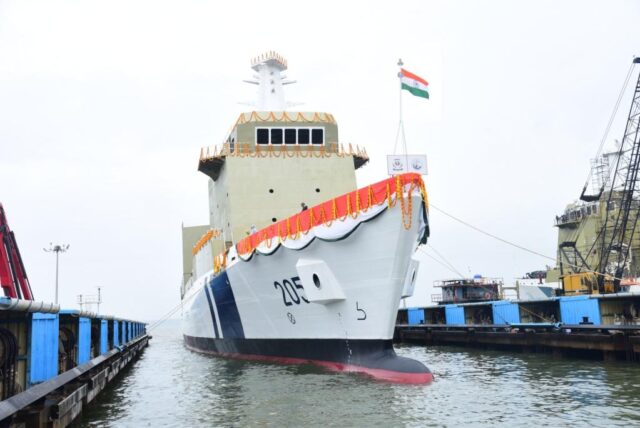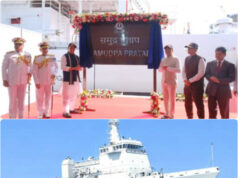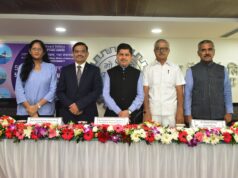Goa Shipyard Limited (GSL), a premier Defence Public Sector Undertaking under the Ministry of Defence, launched the second indigenously designed Pollution Control Vessel (PCV), Yard 1268, for the Indian Coast Guard (ICG), at its shipyard at Vasco-da-Gama, South Goa, on Wednesday, 23rd July 2025.
The vessel, named Samudra Prachet, is the second in a series of two Pollution Control Vessels. The first, Samudra Pratap (Yard 1267), was launched on 29th August 2024. Continuing this legacy, Samudra Prachet was ceremonially launched by Priya Paramesh in an event held at the shipyard.
Paramesh Sivamani, AVSM, PTM, TM, Director General of the Indian Coast Guard, graced the occasion as the Chief Guest. In his address, Sivamani emphasised the strategic importance of the advanced vessel in strengthening India’s capacity for coastal environmental protection and pollution response operations, highlighting its pivotal role in safeguarding marine ecosystems.
Speaking on the occasion, Brajesh Kumar Upadhyay, Chairman & Managing Director of the GSL, underscored the critical importance of the vessel in advancing India’s maritime environmental preparedness. He also commended the dedicated efforts of team GSL for achieving an exceptional 72% indigenous content, a significant contribution to the Government of India’s vision of Aatmanirbhar Bharat and sustainable development in the maritime domain.
Designed and constructed entirely in-house by GSL, the vessel is tailored to meet the specific operational requirements of the Indian Coast Guard.
With a length of 114.5 metres, a breadth of 16.5 metres, and a displacement of 4,170 tonnes, the ship will be manned by a complement of 14 officers and 115 sailors. It is equipped with two side-sweeping arms capable of collecting oil spills while underway, as well as a modern radar system for detecting oil slicks. The vessel is engineered to recover oil across the full viscosity spectrum, pump in contaminated water, analyse and separate pollutants, and store recovered oil in dedicated onboard tanks.
With 72% indigenous content, the project has significantly contributed to national capability-building, employment generation, and skills enhancement, through active engagement of the local industry and MSMEs associated with production activities within GSL and across its expansive supply chain.






